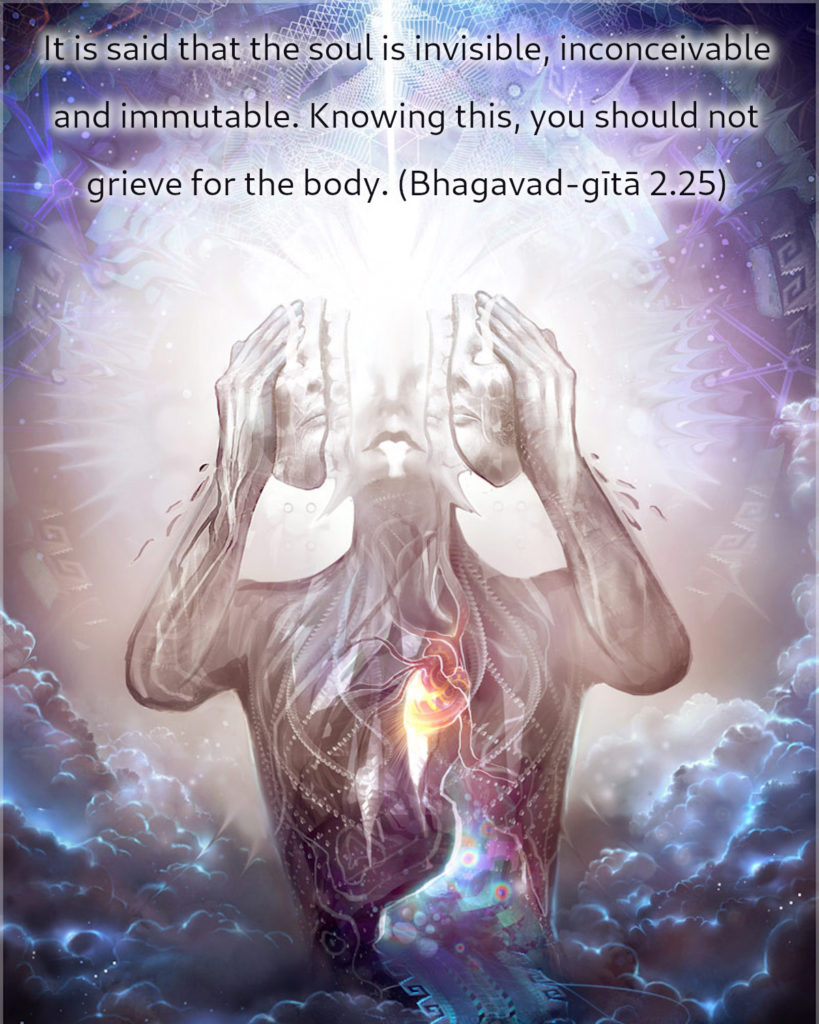अव्यक्तोऽयमचिन्त्योऽयमविकार्योऽयमुच्यते |
तस्मादेवं विदित्वैनं नानुशोचितुमर्हसि || 25||
avyakto ’yam achintyo ’yam avikāryo ’yam uchyate
tasmādevaṁ viditvainaṁ nānuśhochitum arhasi
avyaktaḥ—unmanifested; ayam—this soul; achintyaḥ—inconceivable; ayam—this soul; avikāryaḥ—unchangeable; ayam—this soul; uchyate—is said; tasmāt—therefore; evam—thus; viditvā—having known; enam—this soul; na—not; anuśhochitum—to grieve; arhasi—befitting
Translation:
This self is unknowable by the senses, unthinkable by the mind, and is not subject to any kind of change. Knowing this, you should not grieve.
Commentary:
An object made up of gross elements can be seen by the eye. Atma is not such an object. So the eye cannot see it. Since Atma is beyond thought, the mind is powerless to know it, Atma is the eternal substratum that exists after the mind vanishes. When the mind is purified, it merges in the Atma and disappears, and when the mind disappears the whole of the objective world disappears, and only Atma remains in its own state. How then can the mind understand Atma? Moreover, every object in the world goes through six processes of change -birth, growth, etc. Atma is not born, is not subject to death, is changeless and eternal. It is the eternal subject, the seer, It is the eternal witness of the universe. It is the very essence of Existence, Knowledge, and Bliss. It is the final cause of the Universe. Ultimately the Universe dissolves into Atma and it alone remains without a second.
You should not grieve: The root cause of all sorrow is man’s ignorance of his real nature, and his identification with the body and mind. Thus sorrow takes possession of the embodied being. Sorrow (`Soka’) is the direct consequence of ignorance (`Moha’). But when, by the study of the `Sastras’ and by the grace of God and ‘Guru’, man comes to know that he is not the body but the Self (Atma), all sorrow leaves at once. This is the solution to the whole spiritual problem. Man should know and establish himself firmly in the Self. All spiritual practices are intended to pave the way for this blissful consummation. So long as there is the slightest separation between Atma and the individual being, there is scope for fear and sorrow to enter one way or the other. But when the union is complete, then is only bliss and blessedness all around. Lord Krishna exhorts Arjuna to know the Truth and transcend all sorrow and delusion. From this, we understand that the realisation of the Self is the only way to become free from the twin evils of ignorance and sorrow (`Moha and Soka’). Knowledge alone is the pure light to dispel the darkness of samsara.
Related Articles:
- But with these eyes of yours you cannot see Me. I give you a divine eye; behold, now, My sovereign yoga-power. (BG 11.8)
Question: What further is the nature of Atma?
Answer: It cannot be seen by the senses, cannot be understood by the mind, is not subject to any kind of change.
Question: What is the way to transcend sorrow?
Answer: To know that he is Atma and not the body and mind, is the way to transcend sorrow.
